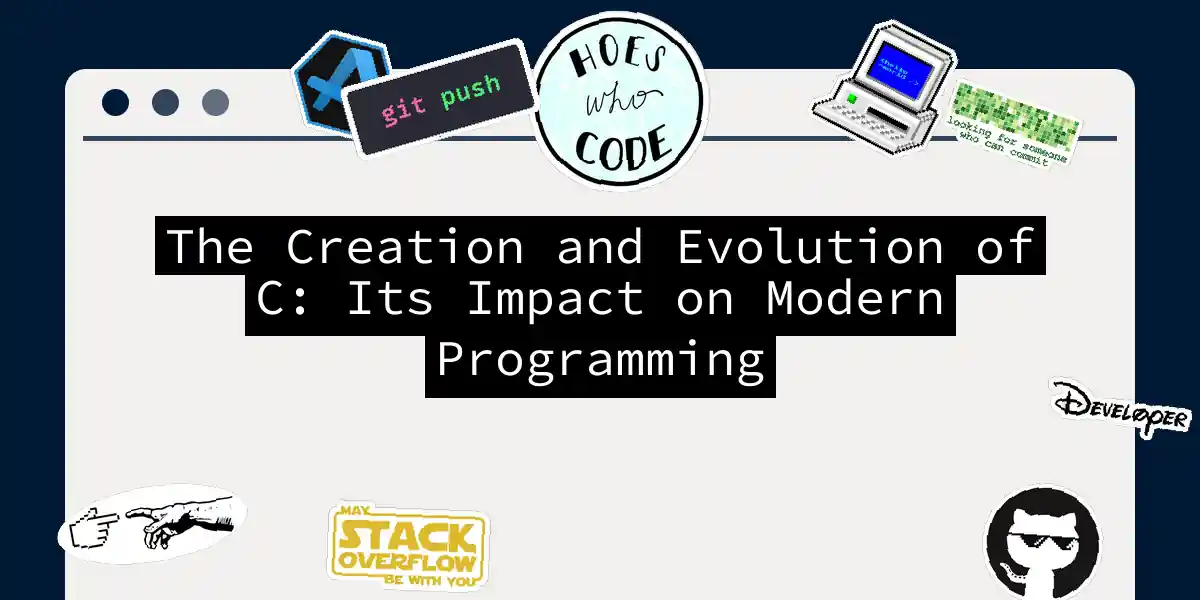The Birth of a Legend: C Programming Language
In the realm of programming languages, few have had as profound an impact as C. Created in the early 1970s by Dennis Ritchie at Bell Labs, C has become the cornerstone of modern programming, influencing a myriad of subsequent languages and shaping the way we develop software today.
The Genesis of C
Before C, high-level programming languages were often cumbersome and limited, forcing developers to resort to assembly language or machine code for many tasks. This was the landscape that Dennis Ritchie and Brian Kernighan faced when they began working on C between 1969 and 1973.
The story goes that Ritchie wanted to port his favorite computer game to his work computer, which lacked an operating system. This led him to rewrite the existing system, initially written in assembly, using the B language. However, the limitations of B prompted the creation of a new language—C.
Key Features and Advantages
C was designed to be a general-purpose, compiled language that could efficiently manage system resources. Here are some of its key features that have made it so enduring:
Portability
C code can be compiled on a wide range of platforms, thanks to the widespread availability of compilers. This makes C a universal tool for development.
High Performance
Programs written in C execute quickly, which is crucial for system programming and applications requiring high efficiency.
Resource Efficiency
Compiled C programs typically occupy minimal space, contributing to disk space and memory savings.
C in Action: A Simple Example
To illustrate the simplicity and power of C, let’s look at a classic “Hello, World!” example:
#include <stdio.h>
int main() {
printf("Hello, World!\n");
return 0;
}
This example demonstrates the basic structure of a C program, including the inclusion of the stdio.h header file for input/output operations and the main function where program execution begins.
Influence on Modern Programming
C’s impact on modern programming is multifaceted:
Operating Systems
C was instrumental in the development of the UNIX operating system, which has influenced numerous other operating systems, including Linux. The portability and efficiency of C made it an ideal choice for system programming.
Subsequent Languages
C has been the foundation for many subsequent languages, including C++, C#, Java, and Objective-C. Each of these languages has built upon the principles and syntax of C, adding new features and paradigms.
System Programming
C remains a staple in system programming due to its ability to provide low-level access to hardware resources. This makes it essential for developing drivers, embedded systems, and high-performance server applications.
Object-Oriented Programming with C++
One of the most significant evolutions of C is C++, developed by Bjarne Stroustrup in the early 1980s. C++ added object-oriented programming (OOP) features such as classes, inheritance, and polymorphism.
This example illustrates the OOP concept of inheritance, where Dog and Cat classes inherit from the Animal class.
Modern Applications of C
Despite the rise of newer languages, C continues to be widely used in various domains:
Embedded Systems
C is often the language of choice for embedded systems due to its efficiency and low-level control over hardware.
Operating Systems
C remains crucial for operating system development, including kernel programming and device drivers.
High-Performance Applications
C is used in applications requiring high performance, such as game development, scientific simulations, and real-time systems.
Conclusion
The creation and evolution of the C programming language have left an indelible mark on the world of software development. From its humble beginnings as a solution to a specific problem to its current status as a foundational language, C continues to influence modern programming practices. Whether you’re a seasoned developer or just starting out, understanding C is essential for appreciating the roots of many modern programming languages and for developing efficient, high-performance software.
In the words of Dennis Ritchie, “C is quirky, flawed, and an enormous success.” This quirky, flawed language has indeed become an enormous success, and its legacy continues to shape the future of programming.
